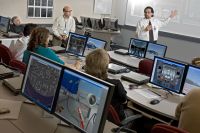27 JULY 2015
YOUR WORDS
Readers are invited to add their comments to any story. Click on the article to see and add.
BTN DISTRIBUTION
BTN also goes out by email every Sunday night at midnight (UK time). To view this edition click here.
The Business Travel News
PO Box 758
Edgware HA8 4QF
United Kingdom
info@btnews.co.uk
© 2022 Business Travel News Ltd.
Article from BTNews 27 JULY 2015
Air industry jobs
Boeing has released a new forecast showing continued strong demand for commercial airline pilots and maintenance technicians as the world's airlines add 38,000 aircraft to the global fleet over the next 20 years.  Boeing's 2015 Pilot and Technician Outlook projects that between 2015 and 2034 the world will require 558,000 new commercial airline pilots and 609,000 new commercial airline maintenance technicians.
Boeing's 2015 Pilot and Technician Outlook projects that between 2015 and 2034 the world will require 558,000 new commercial airline pilots and 609,000 new commercial airline maintenance technicians.
"To help address this need, Boeing trained last year a record number of pilots and technicians at 17 training campuses around the globe and has invested in a comprehensive Pilot Development Program to train early stage pilots to become qualified commercial airline pilots," said Sherry Carbary, Vice President, Boeing Flight Services. "We will continue to increase the amount of training we provide, enabling our customers to satisfy the world's growing appetite for air travel."
Boeing's 2015 Outlook projects continued increases in pilot demand, up more than 4% compared to the 2014 Outlook. For maintenance technicians, demand increased approximately 5%.
Overall global demand for these skilled resources will be driven by continued economic expansion, resulting in an average requirement for about 28,000 new pilots and more than 30,000 new technicians every year. www.boeing.com/commercial
OUR READERS' FINEST WORDS (All times and dates are GMT)
All comments are filtered to exclude any excesses but the Editor does not have to agree with what is being said. 100 words maximum
Carole Leach, Southend Airport UK
It is great Boeing forecasting numbers of engineering staff required but in the UK the official figures show that fewer than 800 people work in these roles. With almost 12,000 maintenance licenses issued by the UK CAA this is clearly wrong and due to the roles in aircraft maintenance being rolled into manufacturing (wrong SIC and SOC codes don't identify the roles in MRO & Part M let alone the aftermarket sector). The skills needed by the OEM's and MRO/continuing airworthiness technical support are not the same yet until the new Trailblazer apprenticeships are available next year we are still having to adapt manufacturing frameworks and do not have a single qualification available to support Part M activities. All the value of MRO and Part M are attributed to manufacturing so the service side of the sector is undervalued and not supported adequately by BIS. We need an industry partnership for aviation services to enable the sector to promote our benefit to the economy and act as a focus for government support for the jobs we provide across ground and flight ops and continuing airworthiness/MRO in the same way that UK manufacturers have so successfully done for aerospace.
